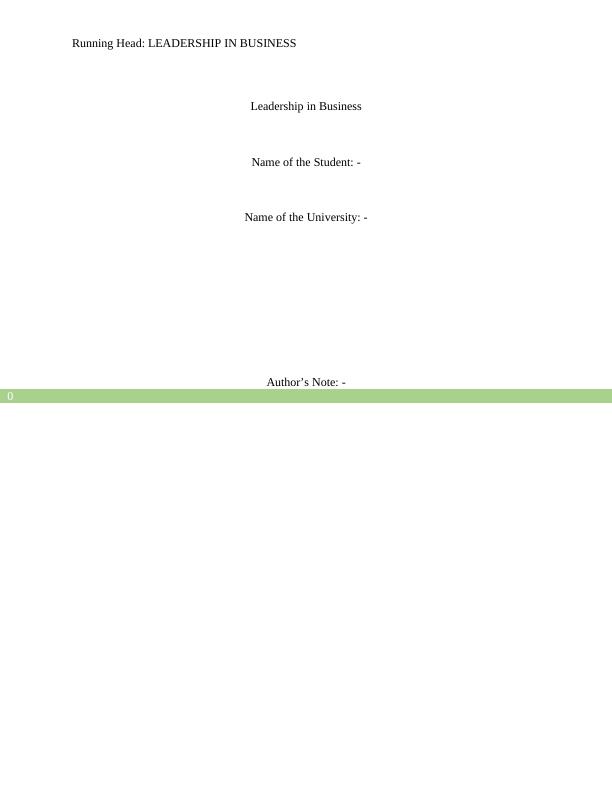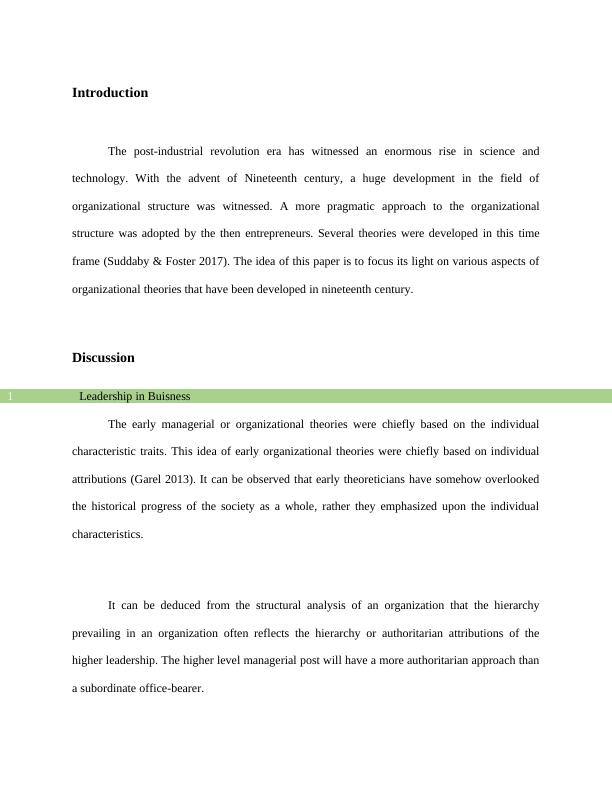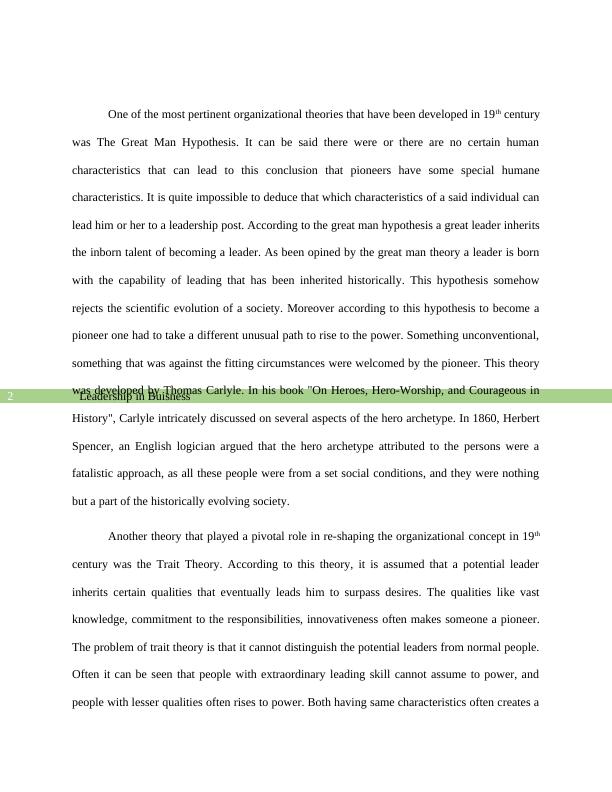Leadership in Business
Added on 2022-12-19
8 Pages1605 Words1 Views
0
Running Head: LEADERSHIP IN BUSINESS
Leadership in Business
Name of the Student: -
Name of the University: -
Author’s Note: -
Running Head: LEADERSHIP IN BUSINESS
Leadership in Business
Name of the Student: -
Name of the University: -
Author’s Note: -

Leadership in Buisness1
Introduction
The post-industrial revolution era has witnessed an enormous rise in science and
technology. With the advent of Nineteenth century, a huge development in the field of
organizational structure was witnessed. A more pragmatic approach to the organizational
structure was adopted by the then entrepreneurs. Several theories were developed in this time
frame (Suddaby & Foster 2017). The idea of this paper is to focus its light on various aspects of
organizational theories that have been developed in nineteenth century.
Discussion
The early managerial or organizational theories were chiefly based on the individual
characteristic traits. This idea of early organizational theories were chiefly based on individual
attributions (Garel 2013). It can be observed that early theoreticians have somehow overlooked
the historical progress of the society as a whole, rather they emphasized upon the individual
characteristics.
It can be deduced from the structural analysis of an organization that the hierarchy
prevailing in an organization often reflects the hierarchy or authoritarian attributions of the
higher leadership. The higher level managerial post will have a more authoritarian approach than
a subordinate office-bearer.
Introduction
The post-industrial revolution era has witnessed an enormous rise in science and
technology. With the advent of Nineteenth century, a huge development in the field of
organizational structure was witnessed. A more pragmatic approach to the organizational
structure was adopted by the then entrepreneurs. Several theories were developed in this time
frame (Suddaby & Foster 2017). The idea of this paper is to focus its light on various aspects of
organizational theories that have been developed in nineteenth century.
Discussion
The early managerial or organizational theories were chiefly based on the individual
characteristic traits. This idea of early organizational theories were chiefly based on individual
attributions (Garel 2013). It can be observed that early theoreticians have somehow overlooked
the historical progress of the society as a whole, rather they emphasized upon the individual
characteristics.
It can be deduced from the structural analysis of an organization that the hierarchy
prevailing in an organization often reflects the hierarchy or authoritarian attributions of the
higher leadership. The higher level managerial post will have a more authoritarian approach than
a subordinate office-bearer.

Leadership in Buisness2
One of the most pertinent organizational theories that have been developed in 19th century
was The Great Man Hypothesis. It can be said there were or there are no certain human
characteristics that can lead to this conclusion that pioneers have some special humane
characteristics. It is quite impossible to deduce that which characteristics of a said individual can
lead him or her to a leadership post. According to the great man hypothesis a great leader inherits
the inborn talent of becoming a leader. As been opined by the great man theory a leader is born
with the capability of leading that has been inherited historically. This hypothesis somehow
rejects the scientific evolution of a society. Moreover according to this hypothesis to become a
pioneer one had to take a different unusual path to rise to the power. Something unconventional,
something that was against the fitting circumstances were welcomed by the pioneer. This theory
was developed by Thomas Carlyle. In his book "On Heroes, Hero-Worship, and Courageous in
History", Carlyle intricately discussed on several aspects of the hero archetype. In 1860, Herbert
Spencer, an English logician argued that the hero archetype attributed to the persons were a
fatalistic approach, as all these people were from a set social conditions, and they were nothing
but a part of the historically evolving society.
Another theory that played a pivotal role in re-shaping the organizational concept in 19th
century was the Trait Theory. According to this theory, it is assumed that a potential leader
inherits certain qualities that eventually leads him to surpass desires. The qualities like vast
knowledge, commitment to the responsibilities, innovativeness often makes someone a pioneer.
The problem of trait theory is that it cannot distinguish the potential leaders from normal people.
Often it can be seen that people with extraordinary leading skill cannot assume to power, and
people with lesser qualities often rises to power. Both having same characteristics often creates a
One of the most pertinent organizational theories that have been developed in 19th century
was The Great Man Hypothesis. It can be said there were or there are no certain human
characteristics that can lead to this conclusion that pioneers have some special humane
characteristics. It is quite impossible to deduce that which characteristics of a said individual can
lead him or her to a leadership post. According to the great man hypothesis a great leader inherits
the inborn talent of becoming a leader. As been opined by the great man theory a leader is born
with the capability of leading that has been inherited historically. This hypothesis somehow
rejects the scientific evolution of a society. Moreover according to this hypothesis to become a
pioneer one had to take a different unusual path to rise to the power. Something unconventional,
something that was against the fitting circumstances were welcomed by the pioneer. This theory
was developed by Thomas Carlyle. In his book "On Heroes, Hero-Worship, and Courageous in
History", Carlyle intricately discussed on several aspects of the hero archetype. In 1860, Herbert
Spencer, an English logician argued that the hero archetype attributed to the persons were a
fatalistic approach, as all these people were from a set social conditions, and they were nothing
but a part of the historically evolving society.
Another theory that played a pivotal role in re-shaping the organizational concept in 19th
century was the Trait Theory. According to this theory, it is assumed that a potential leader
inherits certain qualities that eventually leads him to surpass desires. The qualities like vast
knowledge, commitment to the responsibilities, innovativeness often makes someone a pioneer.
The problem of trait theory is that it cannot distinguish the potential leaders from normal people.
Often it can be seen that people with extraordinary leading skill cannot assume to power, and
people with lesser qualities often rises to power. Both having same characteristics often creates a

End of preview
Want to access all the pages? Upload your documents or become a member.
Related Documents
Assignment - Leadership Managementlg...
|7
|1900
|94
Theories of Leadershiplg...
|8
|2624
|49
Leadership and management theories in Woolworths Group and ASDA Grouplg...
|8
|1499
|142